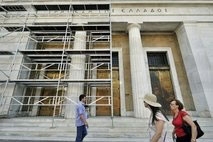Eurozone launches vast bid to solve debt woes
 After weeks for market pressure and pleas from the US and the International Mmonetary Fund to contain the year-long debt drama, the eurozone poured another 159 billion euros ($229 billion) into Greece with private creditor help and deployed a safety net for future crises.
After weeks for market pressure and pleas from the US and the International Mmonetary Fund to contain the year-long debt drama, the eurozone poured another 159 billion euros ($229 billion) into Greece with private creditor help and deployed a safety net for future crises.
The deal was cheered in Asian and European stock markets in early trade on Friday and gave the euro a boost after weeks of turbulence that sucked Italy and Spain into the debt spiral.
The leaders even accepted the risk of Greece becoming the first nation in the euro's 12-year history to default, a price to pay to convince banks to take losses in a new rescue, one year after a 110-billion-euro bailout failed to put Athens back on its feet.
They also vowed to keep supporting the two other eurozone nations that have received bailouts, Portugal and Ireland, until they are stable enough to borrow on the private markets again.
"Our ambition is to seize the Greek crisis to make a quantum leap in eurozone governance," French President Nicolas Sarkozy said at the close of an emergency summit late Thursday..
European Union president Herman Van Rompuy said leaders had shown that they would "not waver in the defence of our monetary union and our common currency."
"This threat had to be contained, otherwise the situation could have led to a serious loss of confidence in our common currency and could even have jeopardised the ongoing economic recovery in Europe and the world," he added.
A deal emerged after weeks of fractious debate as Germany, Europe's paymaster, the Netherlands and Finland insisted on bank participation even at the risk of default.
France and the European Central Bank had opposed such a drastic scenario but a compromise was finally reached at an 11th-hour meeting between Sarkozy, German Chancellor Angela Merkel and ECB chief Jean-Claude Trichet late Wednesday.
The ECB secured a key demand for the the 17-nation eurozone's crisis fund to buy bad debt from struggling nations, a role the Frankfurt central bank had taken on alone until now.
The sweeping agreement expands the powers of the European Financial Stability Facility (EFSF), allowing it to relieve debt-stricken nations by buying their sovereign bonds at lower prices on secondary markets and providing bailouts for their banks.
Sarkozy said this amounted to "the initiation of a European monetary fund."
In what IMF chief Christine Lagarde called a "game-changing decisions," the eurozone also agreed to extend loan repayments and lower interest rates for Greece, Ireland and Portugal.
"All eurozone nations put aside their national selfishness and stated the principle that eurozone states cannot go into bankruptcy," said Italian Prime Minister Silvio Berlusconi.
The deal "went beyond market expectations," BNP Paribas said in a research note, calling the agreement "a major step towards stabilising the markets and a resolution of the debt crisis."
ING bank said in a research not that the new Greek aid package "is a positive development for the Euro area and it's a first step through the creation of a common fiscal and economic policy.
With pressure to address long-standing weaknesses, Sarkozy and German Chancellor Angela Merkel said they would propose in the coming weeks an overhaul of economic governance in the eurozone -- a step towards deeper integration demanded by markets.
The single currency area was born in 1999, but without a common budgetary policy, other than debt and deficit rules, to prevent wayward spending as each state wanted to guard its fiscal sovereignty.
What the stars mean:
★ Poor ★ ★ Promising ★★★ Good ★★★★ Very good ★★★★★ Exceptional
 Tag:
Tag:
Related Contents
Latest News
More News
- Russian President congratulates Vietnamese Party leader during phone talks (January 25, 2026 | 09:58)
- Worldwide congratulations underscore confidence in Vietnam’s 14th Party Congress (January 23, 2026 | 09:02)
- Political parties, organisations, int’l friends send congratulations to 14th National Party Congress (January 22, 2026 | 09:33)
- 14th National Party Congress: Japanese media highlight Vietnam’s growth targets (January 21, 2026 | 09:46)
- 14th National Party Congress: Driving force for Vietnam to continue renewal, innovation, breakthroughs (January 21, 2026 | 09:42)
- Vietnam remains spiritual support for progressive forces: Colombian party leader (January 21, 2026 | 08:00)
- Int'l media provides large coverage of 14th National Party Congress's first working day (January 20, 2026 | 09:09)
- Vietnamese firms win top honours at ASEAN Digital Awards (January 16, 2026 | 16:45)
- ASEAN Digital Ministers' Meeting opens in Hanoi (January 15, 2026 | 15:33)
- ASEAN economies move up the global chip value chain (December 09, 2025 | 13:32)






















 Mobile Version
Mobile Version